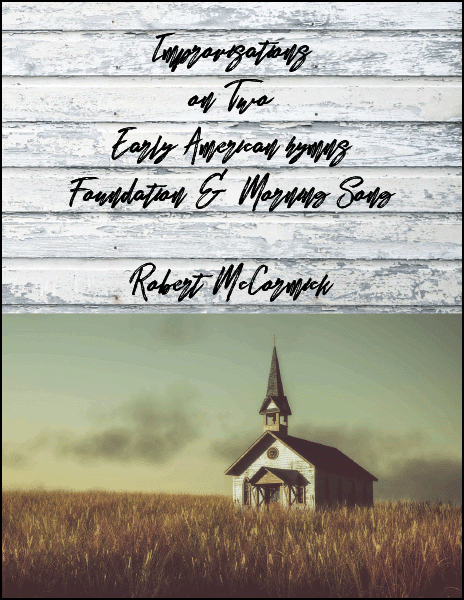|
Composer Robert McCormick
Released 6/2023
Use Instrumental
Difficulty Moderately diff.
Catalog no. 160-687
Price $20 (U.S.)
Order now!


Order PDF download!


Description
As a performer, Robert McCormick has long specialized in organ improvisations, and these two pieces are transcriptions (by Bryan Dunnewald) of improvisations McCormick played at St. Mark's Episcopal Church in Philadelphia. Based on two classic early American hymns tunes, FOUNDATION and MORNING SONG, they make for rousing and fun preludes on the tunes. Two classics of the French organ literature served as models. The improvisation on FOUNDATION is modeled on Duruflé's "Choral varié sur le 'Veni Creator,' " and the improvisation on MORNING SONG is in homage to Marcel Dupré--modeled on that composer's "Variations sur un Noël."
|
| |
|

Robert McCormick's improvisation on FOUNDATION

Robert McCormick's improvisation on MORNING SONG

Review
"These fantastic improvisations use classic pieces in the French organ repertoire as models and inspiration. Originally performed during the pandemic, when in-person music making was impossible, they have been transcribed by Bryan Dunnewald. (You can listen to the original recordings on the Selah website.) A few minor adjustments were made—whether for consistency or to clean up voice leading—but these transcriptions amply demonstrate the great skill in improvisation that McCormick has developed over many years. For example, he not only improvises a canon at the octave, but also canons at the sixth and at the ninth. Overall, it is difficult to believe that these are not fully composed pieces, such is the harmonic and structural clarity of McCormick’s improvisations. (A third improvisation, a Prelude and Fugue on McKEE, is in the process of publication, and I hope there will be more to follow.)
The first piece, Variations on FOUNDATION, is an homage to Maurice Duruflé’s Choral varié sur 'Veni Creator,' while the second, Variations on MORNING SONG, is an homage to Marcel Dupré’s Variations sur un Noël. The first is about the same length as the Duruflé and includes very similar textures. The pentatonic melody is ideal for canonic treatment, and McCormick utilizes a canon at the sixth in the first, third, and final variations, whereas Duruflé treats his chant theme more freely, perhaps because of the mode. Different tunes lend themselves to different treatments, and these canons work beautifully, producing many pleasing consonant intervals. Although there are running triplets in three of the variations, the overall difficulty level is easier than Duruflé, increasing its usefulness for teach ad performance. For example, the twists and turns of Duruflé’s left-hand part in his variation are here made into something more approachable.
The second piece takes a strong tune in the aeolian mode and treats it in the manner of Dupré’s Variations sur un Noël. This improvisation is not as long as its model, taking about seven minutes to perform, but includes many of Dupré’s signature textures, including two scherzo movements and a delicious canon at the night. The final Fuge and Final is brilliantly done: a vigorous fuge with constant eight-note motion builds in excitement through alternating statemetns in the tonic and dominant and culminates in a toccata with a full statement in the pedals, followed by another canon at the octave between the soprano and bass.” --AAM Journal, May/June 2024
|






























